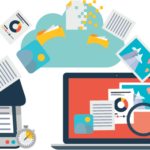Don’t Fear AI — Collaborate With It & Maximize Your Potential (Part-1)
“The development of full artificial intelligence could spell the end of the human race,” Stephen Hawking told the BBC a few years ago. While Elon Musk has sounded even more alarming warnings, Bill Gates has recently suggested that we should not panic as possible issues are not likely to happen anytime soon.
Although depictions of the potential consequences of artificial intelligence (AI) in science fiction often have a tinge of doomsday about them. But the reality is that we are still far from achieving true AI sentience. A recent demo by Google showcased their Duplex technology, which allows their Assistant to make appointments for users by calling businesses in a natural, human-like manner. During one such call, the business representative on the other end of the line seemed to be unaware that they were interacting with a digital assistant.
While passing the Turing test is undoubtedly impressive, the recent Google Duplex demo showcases the true potential of machine learning. The technology was able to learn and emulate natural speech patterns, as well as respond to different scenarios, but it wasn’t thinking for itself. Rather, it operated as an expert system, built and trained on specific rules regarding appointment-making. This type of AI and machine learning can be immensely valuable in extracting insights from data, enhancing customer service, and identifying potential leads.
Also Read This: From Text To Talk: How Will ChatGPT Change the World?
Over the past few years, numerous headlines about robots taking over human jobs have surfaced, causing many workers to feel apprehensive about their career prospects. With the increasing accessibility of generative AI tools like ChatGPT, this anxiety is only expected to grow as workers wonder if their skill sets will remain relevant in the job market.
Although AI is created to enhance and speed up work processes by replacing manual labour, it cannot override the importance of human input in the workspace. This article highlights the continued value that humans bring to the workplace and why they cannot be completely substituted by AI.
Will Robots Replace Human Workers?
The views on the impact of robotics and AI on job displacement seem to be divided. Pew Research conducted a survey of experts and found that 48% of them were concerned that robots and digital agents will displace a significant number of blue- and white-collar jobs, which could lead to income inequality and high levels of unemployment. However, the other half (52%) had a more optimistic view and believed that AI and robotics will create more jobs than they take. This group of experts is confident that humans will be able to use their ingenuity to create new industries, jobs and ways of making a living, similar to what happened during the Industrial Revolution.
The Pew study highlights that both groups share the concern that current educational institutions may not be sufficiently equipping individuals for the job market in the future.
Embrace AI & Get the Most Out Of It
AI is not just increasing productivity but also transforming business practices. According to a survey, 86% of CEOs consider AI to be a crucial part of their daily operations, and it’s not limited to robotics or complex machinery but mainly software that runs their business. AI is becoming increasingly essential for businesses, from forecasting customer behavior to automating manual data entry.
So instead of fearing AI, it’s crucial to keep pace with the ever-evolving technology. And learn how can we get the most out of AI tools and make businesses more efficient and streamlined than ever before.
In this article, we are going to go over seven AI use cases in business.
1. Artificial Intelligence in Sales
Sales experts and companies are re-evaluating the role of humans and machines in sales, as automation AI is already impacting and will continue to impact the sales industry. According to a study conducted by Harvard Business Review, companies that utilize AI in sales can see an increase of over 50% in leads, reduce call time by 60-70%, and cut costs by 40-60%. These results demonstrate that businesses seeking to enhance their profitability should consider integrating Artificial Intelligence into their operations.
Here are a few uses of AI in sales:
Outbound email campaigns – Email campaigns are a reliable part of sales and marketing strategies, and for good reason – they deliver results. However, managing the responses from hundreds or even thousands of emails can be overwhelming. AI solutions can monitor, categorize, and organize email responses according to your preferences, eliminating the need for manual monitoring and flagging of important emails.
2. Artificial Intelligence in Marketing
Market research – Maximize the value of customer feedback and other quantitative responses with the help of AI tools. These tools can analyze large amounts of data without the need for manual tagging from your teams, and insights can be easily centralized for quick access.
Image recognition – Computer Vision enables computers and systems to derive meaning from digital images, videos, and other visual inputs, and make recommendations or take actions based on them. This technology can be utilized by marketers to analyze the vast number of images shared daily on social media platforms, allowing them to gain insights into how products or services are being used and where. This provides new ways to measure market penetration and brand awareness.
Also Read This: How Is Metaverse Going To Impact The Reality Of The World?
Search Engine Optimization (SEO)– The concept of “search volume” is critical in search engine optimization, as it indicates how frequently certain terms and phrases are being searched by individuals seeking products or services. With the advent of Machine Learning (ML) algorithms, the intent behind the use of search terms as well as the substance of searches can now be better understood. You can utilize AI tools to analyze the SEO strategies of your competitors and identify any weaknesses in your approach or opportunities to capitalize on underutilized keywords. AI can also assist in creating search engine-optimized marketing content for your website.
In the next part of this blog series, we will discuss more specific use cases of AI in various industries and how businesses are leveraging AI to gain a competitive edge. Stay tuned!







![[Infographic] Things of the ‘Internet of Things’](https://alliedc.com/wp-content/uploads/2015/04/IOTSENSORS-150x150.jpg)